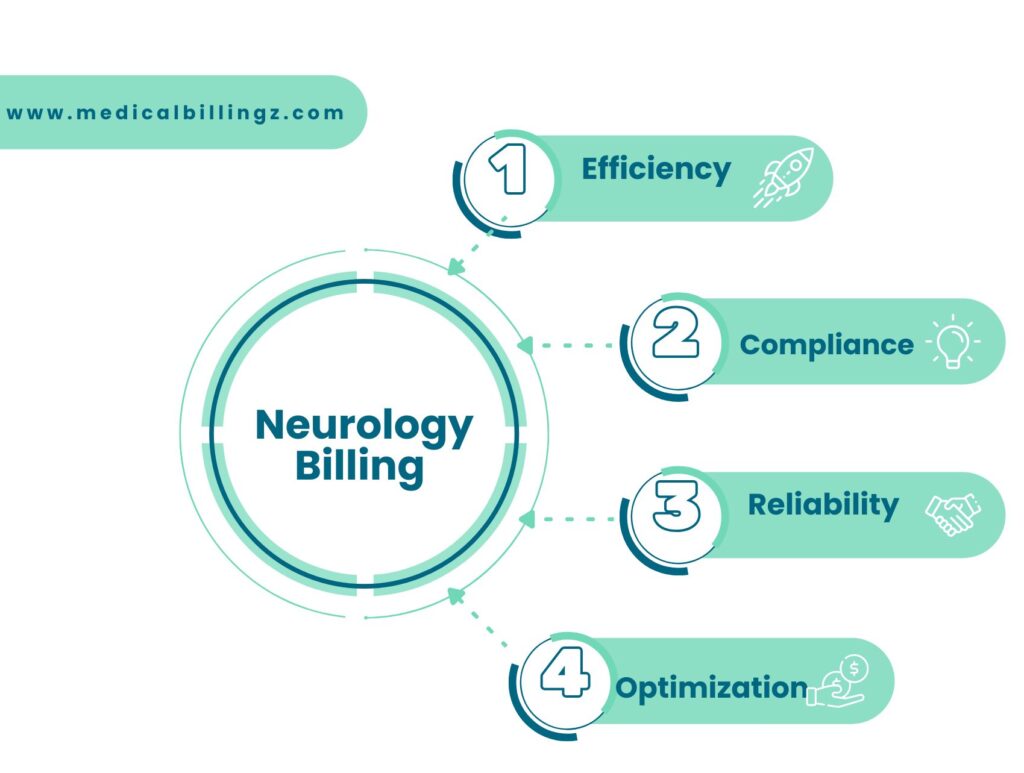As a subspecialty of medicine, neurology addresses the identification and management of conditions pertaining to the nervous system. Due to the intricacy of Neurology Medical Billing in this field necessitates a sophisticated comprehension of different services, procedures, and coding guidelines.
Neurology Medical billing includes managing insurance claims, making sure that proper coding is used, and figuring out the intricacies of payer regulations.
What is Neurology Medical Billing?
Neurology Medical Billing is the process of filing claims to health insurance companies and then following up on them in order to get paid for the services that neurologists provide.
Making sure healthcare providers are fairly and promptly compensated for the services they render is the aim of medical billing. Due to the intricacy of neurological disorders and the numerous diagnostic procedures required, neurology billing is distinct.
Important Elements of Neurology Medical Billing:
- Patient Registration: Compiling personal data, insurance information, and medical history is the first step in the registration process.
- Coding: When it comes to billing for neurology, accuracy is essential. Numerous procedures are carried out by neurologists, and each one needs to be precisely coded in order to guarantee proper billing.
- Claim Submission: The claim is sent to the insurance provider for payment after coding is finished.
- Follow-up: To make sure the right payment is made in the event that a claim is rejected or underpaid, a follow-up is required.
The Neurological System’s Complexity Invoicing
Because neurological disorders are complex and involve a wide range of diagnostic and therapeutic procedures, neurology billing is particularly complicated. Neurologists treat a wide range of illnesses, including multiple sclerosis, epilepsy, Parkinson’s disease, Alzheimer’s, and stroke.
Particular imaging studies, treatment regimens, and diagnostic tests are needed for each of these ailments.

Elements That Add to Complexity:
The elements that add to the complexity of Neurology Medical Billing are as follows:
Variety of Services:
Electroencephalograms (EEGs), nerve conduction studies, and lumbar punctures are just a few of the intricate procedures that fall under the broad category of neurology services.
Large Volume of Diagnostic Testing:
MRIs, CT scans, and blood tests are just a few of the many diagnostic tests that neurologists frequently perform. Each test needs to be correctly coded.
Specification Requirements for Documentation:
Because neurological conditions are complicated, thorough documentation is necessary to support billing and guarantee that requirements set forth by payers are met.
Common Neurology Coding Procedures
The foundation of medical billing is coding. Precise coding guarantees that the rendered services are accurately documented and that the medical professional is fairly compensated.
Multiple coding systems are used in Neurology Medical Billing, such as the Healthcare Common Procedure Coding System (HCPCS), Current Procedural Terminology (CPT), and the International Classification of Diseases (ICD-10).
Coding for ICD-10:
Diseases and medical conditions are coded and categorized using ICD-10 (International Classification of Diseases, 10th Edition). Considering the wide range of neurological disorders, neurology encompasses a large number of ICD-10 codes. As an illustration:
G40: Recurrent seizures and epilepsy
G20: Infirmity of Parkinson
Alzheimer’s disease (G30)
Curious about optimizing your neurology billing?
Coding for CPT:
Healthcare practitioners’ medical, surgical, and diagnostic services are coded using CPT (Current Procedural Terminology). CPT codes for neurology include procedures like:
95957: Digital analysis of EEG
95816: A wakeful but sleepy electroencephalogram (EEG)
Electromyography with needles; thoracic paraspinal muscles, 95869
Coding for HCPCS:
Medicare and other insurance providers are billed using codes from the Healthcare Common Procedure Coding System, or HCPCS. In neurology, HCPCS codes frequently pertain to medical supplies and equipment.
Difficulties with Neurology Medical Billing
Given the complexity of neurological conditions and the requirement for precise documentation and coding, medical billing in the field of neurology can be quite difficult. Among the most typical difficulties are:
- Denials and Rejections:
Insurance companies frequently reject claims related to neurology. These denials can result from a variety of problems, including incorrect coding, incomplete or insufficient documentation, or failure to meet the specific requirements of insurance payers.
For example, if the documentation fails to conclusively justify the need for a procedure, or if a claim is coded incorrectly, the insurance company may reject the claim.
These denials can cause a substantial loss of revenue and necessitate additional time and resources to resolve, frequently requiring an appeals process to overturn the decision and obtain payment.

- Coding errors:
Accurate coding is especially difficult in Neurology Medical Billing because the field deals with complicated medical conditions and procedures.
Because neurological diagnoses and treatments are so detailed, even a small coding error, like selecting the incorrect diagnosis or procedure code, can lead to underpayments or claim rejections.
In addition to guaranteeing payment, accurate coding is necessary to uphold regulatory compliance, avert audits, and prevent fines.
- Changing Regulations:
Regulations pertaining to the healthcare sector, including neurology, are always changing. Payer policies, reimbursement models, and coding guidelines may all be impacted by these modifications.
The way claims should be submitted, for instance, may change in response to updates to the Current Procedural Terminology (CPT) codes or the International Classification of Diseases (ICD) codes.
Practices that specialize in neurology need to be aware of these developments and quickly adjust in order to maintain accurate billing and prevent cash flow problems.
Recommended Procedures for Neurology Medical Billing
It is crucial to put best practices that guarantee accuracy, compliance, and efficiency into practice in order to overcome the difficulties associated with medical billing for neurology. Among the crucial best practices are:
1. Precise and Comprehensive Recordkeeping:
In neurology billing, thorough documentation is essential. All services rendered, including diagnosis processes, treatment plans, and patient histories, ought to be meticulously recorded. Accurate documentation aids in audits and supports accurate coding.
2. Consistent Coding Instruction:
Billing staff members must receive continual training due to the intricacy of neurology coding. Frequent training sessions on the most recent payer policies and coding guidelines can help to improve billing accuracy and lower errors.
3. The Process of Pre-authorization:
Provide a simplified procedure for acquiring pre-authorization for operations that call for it. This guarantees that claims won’t be turned down for lack of permission.
Ready to boost your practice’s efficiency?
4. Handling Denials Well:
To monitor and evaluate claim denials, put in place a strong denial management procedure. Making the required adjustments to lower denials in the future can be aided by identifying common reasons for denials.
5. Using Software for Billing:
Make use of specialist neurology billing software that offers real-time analytics, claims tracking, and automated coding. This can lower errors and greatly improve the billing process’s efficiency.
Common Neurology Medical Billing CPT Codes and Descriptions
| CPT Code | Description |
| 95957 | EEG digital analysis |
| 95816 | Electroencephalogram (EEG), awake/drowsy |
| 95869 | Needle electromyography, thoracic |
| 95900 | Nerve conduction studies; sensory |
| 95921 | Autonomic function testing |
Conclusion
Neurology Medical Billing is intrinsically complicated, reflecting the complexity of neurological care. The procedure necessitates exacting attention to detail, from precise coding and comprehensive documentation to strict compliance with changing regulations.
The ability to effectively navigate these challenges and ensure that services are accurately billed and promptly reimbursed is critical to the financial health of neurology practices.
Neurology practices can effectively manage the complexity of medical billing by focusing on accuracy, efficiency, and compliance; this will ultimately improve patient outcomes and create a more stable healthcare environment.
In the constantly changing world of healthcare, where precision and compliance are crucial, a well-structured and efficient billing process not only supports the financial sustainability of a practice but also reinforces the quality of care delivered to patients.
FAQs
What makes Neurology Medical Billing considered complex?
Due to the wide variety of neurological conditions and diagnostic techniques involved, neurology medical billing is complicated. Different imaging studies, tests, and treatments are used by neurologists, and each one requires a unique coding system.
Which major coding schemes are applied to billing in neurology?
In neurology billing, the following are the primary coding systems:
The 10th edition of the International Classification of Diseases, or ICD-10, is used to diagnose and categorize illnesses. A term used to describe medical, surgical, and diagnostic services is CPT (Current Procedural Terminology). Medicare and other insurance providers are billed using the Healthcare Common Procedure Coding System, or HCPCS, especially when medical supplies and equipment are involved.
What role do ICD-10 codes play in neurology?
For the accurate diagnosis and classification of neurological conditions, ICD-10 codes are essential. They offer comprehensive details regarding the patient’s condition, which are required for accurate invoicing and payment.

